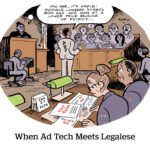 True or false: Social data is the largest and least biased set of observational data that ever existed.
True or false: Social data is the largest and least biased set of observational data that ever existed.
The answer depends on whom you ask.
Twitter sees its platform as a sort of public playground of contextual social conversations. All you need to do is have the right tools to mine the insights. LinkedIn views social data as a nexus for the coming convergence between brand advertising and direct response.
And Facebook is on the fence.
“More intent data is being brought to bear and you can segment people by where they are in the funnel and deliver appropriate messaging,” said Daniel Slotwiner, head of measurement solutions at Facebook. “But is it the biggest unbiased source of data? I’d be careful about that. Bias is a relative term. In some cases the data is representative of a phenomenon and sometimes it’s not.”
Social data was the main topic of discussion at a panel hosted by 4C insights on Wednesday night, where Slotwiner was joined by Jason Leigh, LinkedIn’s global director of insights, and Eddie Smith, head of the ads API at Twitter.
Smith, for his part, was predictably bullish about what he referred to as “the public corpus.”
“In a non-mobile web world, we track people through cookies and make observations as people visit domains [which] we string together to create buckets,” Smith said. “In the social world, especially mobile, we can’t do that. But because information is public on Twitter, we can observe the conversational activity people are having.”
When a consumer appends text to a video – a Vine or a live stream through Periscope, for example – that “becomes part of the public corpus,” Smith said. “That information is extraordinarily valuable from a behavioral marketing perspective, but very different from a traditional cookie-based way of tracking what users are doing.”
Seemingly mundane details can also provide general insights for advertisers to inform their targeting. For example, Twitter has observed a notable, but admittedly unsurprising, increase in the number of people using the word “awake” in tweets in the morning hours. The words “eat” and “run” are also more in use during specific hours of the day.
Creative keyword analysis is another option.
“People don’t go to social media to search, they go there to talk,” Smith said. “We don’t have explicit signals like with search, but we do have implicit signals” which could be “powerful” if strung together in the aggregate.
In other words, targeting should focus on nouns and verbs that connote action and sentiment, like “Taking a trip to” or “Just bought my tickets,” rather than more standard keywords like “Hawaii” or “flight.”
But Facebook’s Slotwiner is more wary about the practical application and activation of broad social signals.
“You can use social to see patterns in user behavior – things like running or waking up are hugely generalizable. But on the activation part, making the jump from social data to running an ad campaign at scale is a tough one,” Slotwiner said.
What Slotwiner is actually seeing more and more of is “microsegmentation and microtargeting” on social media.
“The burden is on the brand. Custom messaging is expensive and they’re running campaigns that aren’t reaching a lot of people, so there are strong results, but they don’t have the magnitude they want,” Slotwiner said. “Taking signals and scaling them for a big audience is a trick we’re all working on [but] I don’t think we’re there yet, where we can say that social data influences the activation of a campaign really well.”















